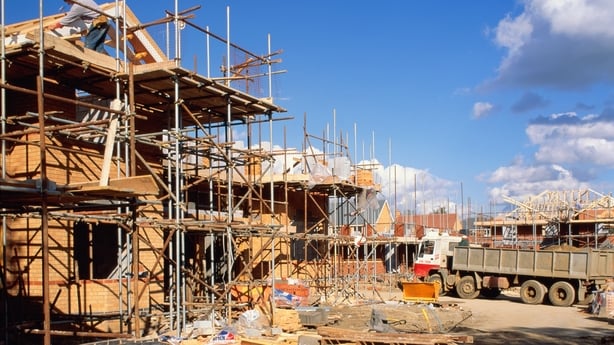The Construction Industry Federation said it welcomed the housing and infrastructure measures in Budget 2021 and said the increased investment in infrastructure to €10.1 billion is a hugely positive step.
But it warned that embedded inefficiencies in the State's planning and procurement systems could dampen positive economic benefits and delay delivery.
CIF Director General Tom Parlon noted that every €1 billion invested this year in infrastructure will generate another €1.85 billion output, support 1,200 jobs and circulate €680m in wages and profits around the economy.
"In the longer-term, this investment will see housing input increase towards 35,000 per annum, the delivery of hundreds of thousands of retrofits, and generate the balanced regional development envisaged in Project Ireland 2040," he said.
Tom Parlon also welcomed the extension of the Help to Buy Scheme up to the end of 2021, saying it has proven to be a critical component of increasing the supply of new homes.
"Without the HTB, the positive impact of any shared equity scheme will be greatly reduced so we believe it should be extended out to 2025 or until output meets the recommend level of 35,000 per annum," he said.
"This will encourage investment by the sector and the banking system into homebuilding and increase supply in the medium term," he added.
The CIF also said the Government's commitment to an affordable homes scheme is welcome, adding that it hopes to see a shared equity scheme in place in the coming months.
"The details of how this scheme will be implemented will be critical and it will mean thousands of houses that our sector cannot currently build will be built. This would take thousands of couples out of the affordability trap," it added.
The Irish Home Builders Association also welcomed the extension of the Help to Buy Scheme into 2021, saying it will bring more certainty and help hopeful buyers secure the required deposit to obtain their residential mortgage which is positive for home buyers.
"It will also assist the rate of commencement of new homes which is badly needed as supply lags significantly behind where it needs to be, IHBA's director James Benson said.
The IHBA also welcomed the extension of the Stamp duty rebate scheme, saying the extension to timelines for starting from six months to 30 months is positive and recognised the delays experienced with the current planning system.

Estate agents Sherry FitzGerald also welcomed the retention of the expanded Help to Buy scheme and the increased capital expenditure on social housing.
But Sherry FitzGerald said the paucity of detail and modest target of 2,000 "affordable homes" on public and private lands was disappointing.
Ivan Gaine, of Sherry FitzGerald New Homes, said that while the extension of the Help to Buy scheme to the end of 2021 is a positive measure, the limited time frame of the extension is perhaps a missed opportunity, as a longer term would have provided greater reassurance to buyers and indeed suppliers.
Mr Gaine said that before the onset of Covid-19, the housing market was suffering a chronic mismatch between supply and demand.
This crisis has been exacerbated further by the fallout of the pandemic, he added.
"New home completions for this year are projected to be less than half the annual requirements. We urgently need to continue on the journey to revitalise our now dormant cities, making them living environments, providing much needed affordable accommodation for our younger people," he added.
The Society of Chartered Surveyors Ireland this evening welcomed the Government's renewed focus on housing in Budget 2021 but warned that the implementation of budgetary measures need to be fully costed while targets have to be time lined and met.
SCSI President Micheál Mahon said the focus too often at budget time was around headline figures and not enough on results and value for money for the taxpayer.
He said that given the economic impact of Covid-19 a renewed focus on both was vital.
But the SCSI described the allocation of €65m for the retrofitting of 2,400 social homes as quite limited and disappointing.
The implementation of a much more expansive programme with funding of €300m had been widely flagged.
"The SCSI said that while the establishment of an apprenticeship scheme for 1,500 people for retrofitting was a step in the right direction, the mismatch which existed between official targets and the resources required to meet them was enormous," Mr Mahon added.

